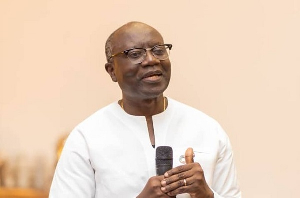 Dr Domfe believes credit should be given to Ken Ofori-Atta for the stability of the economy
Dr Domfe believes credit should be given to Ken Ofori-Atta for the stability of the economy
Development economist and Senior Research Fellow at the Centre for Social Policy Studies (CSPS) at the College of Humanities, of the University of Ghana, Dr George Domfe, has emphasised that former finance minister, Ken Ofori-Atta, is responsible for Ghana’s current economic recovery trajectory.
According to the founding president of Africa Policy Lens (APL), the decision to undertake a debt restructuring program in the face of the economic challenges Ghana faced due to extraneous factors is largely responsible for the recovery the economy is seeing.
“One reason to praise Ken Ofori-Atta is the debt restructuring program! As a result of this, the outflows of foreign currencies to honour the country’s external interest payments and amortisation have gone down drastically! Such are the good things the former finance minister did to save the future. Ghanaians should celebrate him for these efforts.
“Without the DDEP and other equally important policies introduced by the then finance minister, Ken Ofori-Atta, the current performance of the economy would not have been possible. IMF program has helped with the current BOG reserves, which has provided the space for the BOG to intervene in the forex market with almost $1 billion in 2 months,” he said.
He added that; “Indeed, as part of the program, Ghana was supposed to build its reserves. The current Ghana’s exchange rate regime is a Managed Floating Exchange Rate Regime. Under such a regime, the central bank intervenes in the local forex market periodically to protect the local currency. This is exactly what BOG is doing now, significantly because of which the cedi is performing extraordinarily well.
“You cannot give what you don’t have, therefore, the Bank of Ghana is currently giving out more to protect the cedi because it has more reserves, reserves which were increased by Ken Ofori-Atta through his policy interventions.”
On whether the Bank of Ghana and the finance ministry could have injected more than enough dollars into the economy, this is what Dr Domfe said; “Of course, the previous administration could have done same, but the external environment wasn’t conducive as it is now. Indeed, Dr Ernest Addison once mentioned that he could bring the cedi/dollar rate to GH¢10, but such an intervention at the time wasn’t necessary.
“Today, there is a lower demand for foreign currencies as a result of: (A) a fall in the global crude prices (and therefore BDCs are importing refined oil with far less amount of foreign currencies) (B) government’s refusal to pay contractors (C) government not honouring statutory payments. Again, inflows from gold exports and remittances have gone up to improve the supply of foreign currencies. Therefore, when BOG pumps in a whopping $1 billion within 2 months, it is not anything surprise to see the cedi performing so well,” Dr Domfe explained further.
He further noted that the agreement with the bondholders has greatly impacted Ghana’s debt, a reduction of 37 percent in the nominal value of Ghana’s debt, equivalent to USD5 billion, as well as a debt service savings of US$4.3 billion during the IMF program. Interest on bonded debt has also declined from an average of 8 percent to less than 5 percent.
Dr George Domfe further noted that with this significant achievement, the country is poised for a brighter future, enabling the government to shift focus towards sustainable economic growth and development, describing it as a testament to Ghana’s dedication to economic recovery and setting the stage for improved fiscal management and sustainable growth.
